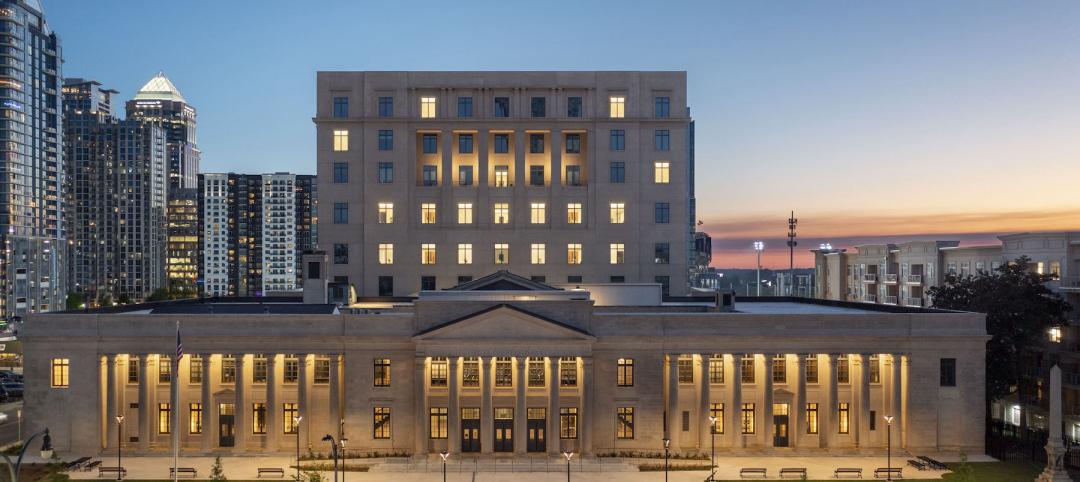BD+C: Why do you state that cities are “our greatest invention”?
Edward Glaeser: Cities matter because they magnify mankind’s greatest strengths. They help form the chains of collaboration and creativity that are behind everything that mankind has been able to do. Mankind’s greatest talent is the ability to learn from each other, and we learn more deeply and thoroughly when we’re face-to-face.
BD+C: You state that massive construction projects—stadiums, light rail, convention centers, etc.—cannot “stem the tidal forces of urban change.” Should mayors and city councils in declining cities just give up?
EG: I believe that there’s been a tendency to confuse cities with their structures. Cities are their people. There are places that need more structures, and they need fewer barriers to development. When you have artificial barriers, such as unrealistic height restrictions and burdensome environmental impact reports, there are tremendous costs from that. Declining areas have too many structures compared to the number of people.
The terrible thing about this strategy is that cities like Detroit need to invest in their children, so that they have the skills to survive in this economy. New sports arenas and the like are enormously expensive and distract city councils and mayors from the core business of providing a brighter future for the children of their cities through education.
BD+C: Detroit has become the poster child of the declining city. Do you have any advice for Mayor Dave Bing?
EG: If you look across the older colder-climate cities, the cities that have come back are those with the largest share of college degrees. Only 12% of Detroit adults have college degrees. I think Mayor Bing is being realistic about Detroit’s prospects. He’s a businessman. I would push him most on leveraging power of things like charter schools, and on top of that, fighting back against some of the regulations that still make it difficult to do business in the city. I was there recently, and there was a woman who was trying to start a business, a food truck, and she couldn’t get a permit because of regulations.
BD+C: “Poverty is usually a sign of a city’s success,” you write.
EG: The key point is that, throughout much of the world, cities attract poor people with the promise of jobs, cheap transportation, relatively affordable housing, and social services. That’s something cities shouldn’t be ashamed of.
BD+C: You advocate reducing the home mortgage interest deduction, which you cleverly call “a sacred cow in need of a good stockyard.” Aren’t you swimming in shark-infested waters here?
EG: It’s the job of an academic to do that. But there are two signs that this is being considered. The Administration’s federal housing finance reform package came out with a clear message that we should not be encouraging everyone to become a homeowner; and in the President’s budget, he sees a restriction on the amount of deductions you could take. The plan I like is to lower the upper limit of $1 million by $100,000 a year over several years.
BD+C: You comment on policies for “aesthetic interventions,” as espoused by the urbanist Richard Florida, versus “urban basics,” like public safety and good schools. Could you expand on that?
EG: Good public art is good, if it’s cheap. But you can’t tell a mayor that you really should have a public arts program, rather than getting the schools in order and having a well-functioning police department. The arts can’t be seen as something that’s going to trump the basics.
Take the case of Bilbao. That museum certainly generated a lot of tourism, but how many jobs were created? Bilbao is the one such project that hit the jackpot. How many others were subsidized, as in Sheffield, England, where the National Centre for Popular Music closed the year it opened. These projects come and go, with massive subsidies, and you have to be wary of them.
BD+C: What about the balkanization of our school districts? Should school funding be more equalized, no matter where the child lives?
EG: This is obviously a huge issue. The most helpful things we have seen so far have been the charter schools. Being an economist, I think competition among schools is the best way to keep upwardly mobile families staying in the city. The great urban virtues are competition and entrepreneurship, and that’s what we’ve not done with our public schools, which are large public monopolies. And because cities do attract poor people, for many reasons, it shows how hard it is to move that dial, even when, as in Chicago and New York and Washington, D.C., you have some of the best people working on the problem.
BD+C: You also state that immigration is “essential to urban success.” That’s hardly a popular sentiment in many parts of the U.S.
EG: Immigration is absolutely essential to the success of our cities. The case is easiest to make for H-1B visas, where we get skilled workers who are going to add energy to the economy, pay more in taxes than they’re going to take out, and who are not going to cause social problems. We should be enabling more people who are skilled and want nothing more than to work in America. Cities are good for immigrants and immigrants are good for cities. BD+C
Related Stories
Higher Education | Aug 7, 2023
Building a better academic workplace
Gensler's David Craig and Melany Park show how agile, efficient workplaces bring university faculty and staff closer together while supporting individual needs.
University Buildings | Aug 7, 2023
Eight-story Vancouver Community College building dedicated to clean energy, electric vehicle education
The Centre for Clean Energy and Automotive Innovation, to be designed by Stantec, will house classrooms, labs, a library and learning center, an Indigenous gathering space, administrative offices, and multiple collaborative learning spaces.
Green | Aug 7, 2023
Rooftop photovoltaic panels credited with propelling solar energy output to record high
Solar provided a record-high 7.3% of U.S. electrical generation in May, “driven in large part by growth in ‘estimated’ small-scale (e.g., rooftop) solar PV whose output increased by 25.6% and accounted for nearly a third (31.9%) of total solar production,” according to a report by the U.S. Energy Information Administration.
Resiliency | Aug 7, 2023
Creative ways cities are seeking to beat urban heat gain
As temperatures in many areas hit record highs this summer, cities around the world are turning to creative solutions to cope with the heat. Here are several creative ways cities are seeking to beat urban heat gain.
Government Buildings | Aug 7, 2023
Nearly $1 billion earmarked for energy efficiency upgrades to federal buildings
The U.S. General Services Administration (GSA) recently announced plans to use $975 million in Inflation Reduction Act funding for energy efficiency and clean energy upgrades to federal buildings across the country. The investment will impact about 40 million sf, or about 20% of GSA’s federal buildings portfolio.
MFPRO+ New Projects | Aug 4, 2023
Nashville gets 'first-of-its-kind' residential tower
Global architecture firm Goettsch Partners announces the completion of Alcove, a new 356-unit residential tower in Nashville, Tenn., developed by Giarratana LLC.
Industrial Facilities | Aug 3, 2023
The state of battery manufacturing in the era of EV
One of the most significant changes seen in today’s battery plant is the full manufacturing process—from raw materials to the fully operational battery.
Government Buildings | Aug 2, 2023
A historic courthouse in Charlotte is updated and expanded by Robert A.M. Stern Architects
Robert A.M. Stern Architects’ design retains the original building’s look and presence.
Hotel Facilities | Aug 2, 2023
Top 5 markets for hotel construction
According to the United States Construction Pipeline Trend Report by Lodging Econometrics (LE) for Q2 2023, the five markets with the largest hotel construction pipelines are Dallas with a record-high 184 projects/21,501 rooms, Atlanta with 141 projects/17,993 rooms, Phoenix with 119 projects/16,107 rooms, Nashville with 116 projects/15,346 rooms, and Los Angeles with 112 projects/17,797 rooms.
Architects | Aug 1, 2023
Ware Malcomb announces hire of Jason Golub as Regional Director
In this role, Golub is responsible for the overall leadership and continued growth of the office.

















